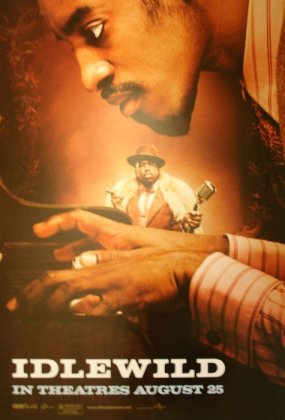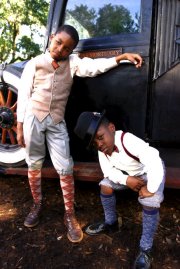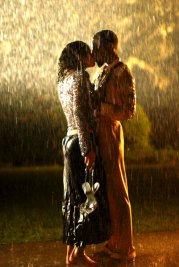|
Idlewild
After
the credits finished rolling we both let out stifled sighs,
rose to our feet, and began the long walk back out to the
parking lot. It took a few minutes to register, but Idlewild
is undoubtedly a troubled and convoluted mess.
What
about the worthy and just stab at creativity? Those points
only get you so far. In fact, as we ultimately concluded,
it is far more damaging to watch a terrible film with such
glaring yet missed potential than it is to watch an ill-conceived
and utterly meaningless project altogether. Idlewild
is, unfortunately, the former.
The
rift between the members of Outkast, Andre Benjamin and
Big Boi, is already the stuff of public discourse legend.
Who is tired of the group? Who is clinging to the past?
Who has already let go and moved on, but appears too gentlemanly
to deal the harsh and brutal truth?
The real question
is, am I referencing the music group, their latest film,
or perhaps a combination of the two?
Like
the duo’s last album, Speakerboxxx / The Love
Below, Idlewild feels split in two. Touted as a musical
set in the prohibition-era South, the film feels more like
a musical of split personalities. Even within the confines
of the musical genre, Idlewild is full of fits
and contradictions. Are the songs meant to represent a performance
within the reality of the filmic space, or are they hyper-real
extensions of expressive angst and confusion, reflecting
the dynamics of the storyline in a dreamlike state?
By the
way, which fourth wall are we meant to be peering through
this time?
The story is
simply complex. Andre and Big Boi play Percival and Rooster,
two fictionalized versions of themselves. These two characters
grew up together, but come from two very different worlds.
Rooster comes from a family tree whose roots are so entangled
in seedy underworld dealings that the young boy finds himself
bootlegging liquor before he’s old enough to drive
– not that this stops him.
Percival is the
straight-laced son of a mortician who shares only one thing
in common with Rooster – a love of music. Percival’s
father keeps him on a tight leash, and when the two have
grown to adulthood, Percival’s only escape is his
nightly stints at a speakeasy called Church.
What
happens to Percival and Rooster is seemingly extrapolated
from the real life drama between Big Boi and Andre. One
seems content with who he is and what he was always meant
to be, while the other seeks a bigger, perhaps brighter
future away from the roots of his past.
Whether
Big Boi realizes it or not, these themes were present on
the duo’s wildly different concept album, and they’ve
seeped into Bryan Barber’s script and direction as
well.
Barber,
whose claim to fame is being the guy who directed those
cool Outkast videos, was undoubtedly influenced by his two
stars. Each one appears to have envisioned wildly differing
films, and what results is the on-screen equivalent of trying
to please both parties and keep the status quo.
The
bulk of Big Boi’s musical performances feel like retreads,
phoned-in cuts from his Speakerboxxx album that
haven’t even been altered to fit into the time period
of the film. References to a host of modern conventions
and phrases stick out like a sore thumb, and Big Boi appears
to not be able to care less.
His
vision of Idlewild is nothing more than an extrapolation
of his work in Outkast music videos, and whenever he is
on screen viewers will be hard-pressed to differentiate
between a theatergoing experience and sitting at home watching
MTV.
Andre,
on the other hand, has brought a host of new songs to the
table, most off which feel like modernized extensions of
period music. No number fully fits the period, but Andre’s
work at least caters heavily to the musical instruments
of the era – piano, horns, and stringed instruments.
His
performance is nuanced and deep, and he gives the appearance
of someone on the verge of a major career changing crossover.
Ultimately,
the missteps outweigh what could have been, and the plot
threads, characters, and loose ends left unattended are
just too difficult to ignore.
What
could have taken on a life of frenetic chaos, absurd hyper-reality,
and socio-contextual “fun” winds up being nothing
more than a chore and a bore.
Sorry
to say it folks, but it looks as though the Outkast engine
has run out of gas.
Rating:

|









